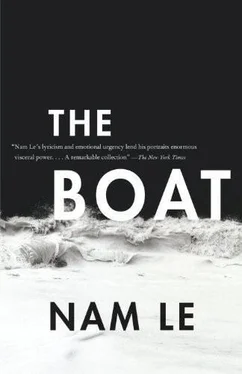"I can't see her," he said.
"She must not have any family," Quyen whispered to Mai.
"She has the right idea," another low voice said. "Is there any better way to go?"
" Thoi ," Anh Phuoc said, coming over. " Thoi , that's enough."
***
REEDUCATION CAMP. For two years those two words had framed the entirety of her imaginative life. Her father, of course, hadn't talked about it when he returned — nor her mother. Now, for the first time, someone talked to her about it. Anh Phuoc had fought in the same regiment as her father — had been sentenced to a camp in the same district. No, he hadn't known him. By the time the Communists took Ban Me Thuot in March 1975, the Americans were long gone and the Southern regiments in tatters — soldiers deserting, taking cover as civilians, fleeing into the jungles. Escape on every man's mind. Soon they all learned there was no escaping the Communists: not in the country they now controlled. They were skilled, he said, at turning north against south, village against village. He fell quiet.
Mai waited. She watched him remembering. Nine days had passed and now she noticed how severely he had aged: his eyes gone saggy, his skin mottled with dark sun spots.
"In the camps," he said, "they do what they do best. They take a man — and then they turn him against things."
From the back deck a middle-aged woman started wading in their direction through the sprawl of bodies. She held the port gunwale with both hands for balance.
"Husbands against wives," he went on. "Children against parents. Your only chance is to denounce everyone, and everything, they tell you to."
The woman reached them. She made her complaint in a hoarse voice. She was owed water. She had tendered hers to another child who had collapsed, she said, and pointed aft. Anh Phuoc held Mai's eyes for a second, then followed the woman.
Her father wouldn't have denounced her — she was sure of that. Not in his own heart. But again she understood how necessary it was to stay on the surface of things. Because beneath the surface was either dread or delirium. As more and more bundles were thrown overboard she taught herself not to look — not to think of the bundles as human — she resisted the impulse to identify which families had been depleted. She seized distraction from the immediate things: the weather, the next swallow of water, the ever-forward draw of time.
"Mai!"
It was Anh Phuoc. She stood up, hauled herself on weak legs along the gunwale, toward the rear of the boat. Past the hatch she suddenly saw Truong — propped up against the rusty mast of the derrick-crane, his chin drooping onto his chest, arms bony and limp by his sides.
Mai leapt forward, swiping her elbows and knees from side to side to clear space. The surrounding people watched listlessly.
"Water!"
No one reacted. She looked around and spotted an army flask — grabbed it, swiveled the cap open, held it to his mouth. A thin trickle ran over his rubbery lips before the flask was snatched away. She looked up and saw a man's face, twisted in hate the moment he struck her, his knuckles hard as a bottle against her cheek. She fell over and covered Truong's body.
"She stole water."
"I'll pay it back," said Anh Phuoc roughly.
Truong started coughing. Mai sat back, her cheek burning, and mumbled apology in the direction of the man. He was picking the flask up from the ground. People glanced over, disturbed by the waste. There had been a minor outcry the previous evening when a woman — an actress, people said — had used the last of her ration to wash her face.
Truong squinted up at Mai. Everything about him: the dark sore of his face, his disproportioned, skeletal limbs, seemed to be ceding its sense of solidity. She touched his blistered cheek with her fingers — was reminded of the sting on her own cheek from the man's blow.
"Ma," he wheezed.
"It's alright," she said. "Ma is coming. Chi is here." "Where's Quyen?" asked Anh Phuoc. He stood up quickly and walked off.
Truong said, "Child wanted to count the people."
He coughed again, the air scraping through his throat. Watching him, a helpless feeling welled up within Mai and started to coalesce at the front of her skull. "Child," she whispered.
Quyen arrived. She seemed to be moving within a slower state, her face drawn, hair tangled. She saw Truong and bent down to him. "Look," she murmured, "you hurt yourself."
"He fainted," said Mai.
"Why didn't Child stay with Ma?"
"I don't like it down there," he said.
"Oh, Mai," Quyen exclaimed, turning to her. "Are you all right?"
"He shouldn't be in the sun. He needs more water."
"It's too dark to count down there," Truong said. He brought up his arms, dangled them loosely over his knees. An old man's pose. Quyen squatted down and enfolded him, clinching him between her elbows, raking one hand through his hair and cupping his forehead with the other.
"I was so tired," said Quyen. "Thank you."
"He needs more water."
"Does Child know?" She was speaking to Truong. "Does Child know how lucky he is? To have Chi Mai look after him?"
Anh Phuoc leaned down close to both of them. "Come with me," he muttered. They followed him forward to the pilothouse, everyone watching as they passed. Once inside he closed the door. Carefully, he measured out a capful of water from a plastic carton and administered it into Truong's mouth.
The sight — even the smell — of the water roused an appalling ache in Mai's stomach, but she said nothing.
"Good boy," said Anh Phuoc.
Quyen's eyes followed the carton. "Is that all there is?"
Holding the tiller with one hand, he reached down and opened the cupboard beneath it. Three plastic white cartons.
"That's all," he said, "unless it rains."
"How long will it last?"
"Another day. Two at the most."
Her temple still aching, Mai looked out of the pilothouse windows. From up here she could see the full length and breadth of the boat: every inch of it clogged with rags and black-tufted heads and sunburned flesh. Up here would be the best place to count people. She wrenched her eyes away from the water carton and looked out instead at the sky. Not a cloud in sight. But the sky was full of deceit — it looked the same everywhere. She looked at the horizon, long and pale and eye-level all around them. Whatever direction she looked, it fell away into more water.
***
THE TENTH DAY DAWNED. Engines dead, the boat drifted on. Gray shadows strafing the water behind it. The detachable sail hoisted onto a short mast's yard and men taking turns, croaking directions to each other as they tried to steer the boat, as best they could, to the south.
Mai watched Truong with renewed intensity. Since Mai's recovery Quyen had kept to herself, remaining huddled, during the day as well as night, underneath the companionway stairs where they all slept. That morning Mai had found her sitting in the slatted light, staring vacantly into the dark hold. Squeezed between two old women.
"How is Truong?" Quyen asked her quietly.
Mai said, "I keep telling him to come down."
"He doesn't like it down here."
Mai nodded, not knowing what to say.
Quyen dropped her chin and closed her eyes. Mai looked her over. She didn't look sick.
"Is Chi alright?"
Quyen nodded almost impatiently. One of the women beside her spat into her hands. When Quyen looked up her face was distant, drawn in unsparing lines.
"Look after him, nha ? Please."
Above deck, each hour stretched out its hot minutes. Mai lay on her back under the derrick-crane, her head against someone's shin, limbs interwoven with her neighbors'. Truong wedged beside her. The crane cast a shadow that inched up their bodies. She threw her sleeve over her face to ward off the sweltering sun. At one point a wind blew in and the boat began to sway, lightly, in the water. She was riding her father's shoulders. Her mother watching them happily. Whenever he was home he brought with him some quality that filled her mother so there was enough left, sometimes, for her to be happy.
Читать дальше











